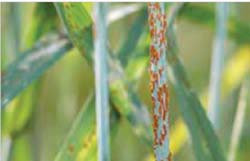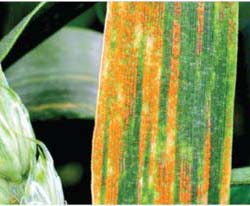Common Cereal Diseases

Cereal farmers continue to face challenges with controlling different forms of rust and Fusarium head blight. The most notorious form of rust is stem rust (Black rust). Stem rust reduces yields and quality of grains and may cause up to 100% yield loses. Over time the greatest challenge facing wheat production in Kenya and globally has been getting varieties that are resistant to the deadly Ug99 strain of stem rust.
Stem rust urediniospores are well-suited for wind dispersal. They are dark-coloured and can tolerate exposure to ultraviolet light, are adapted to a wide humidity and temperature range and are carried in wind currents at altitudes up to 4.5 km.
Another form of rust is yellow rust. Cold, damp weather in the spring, with overnight dew or rain, provides the best conditions for the disease to spread, with characteristic symptoms being parallel rows of yellowish orange coloured pustules on adult plant leaves.
Yield losses of 40–50% often occur in untreated susceptible wheat varieties. However, varietal resistance and well-timed fungicide sprays are usually very effective, so annual losses are often small. In addition, yellow rust affect grain quality.

Amiran Kenya has introduced duo triazole product as a tool to address serious diseases affecting cereal growers. According to Timothy Munywoki, Chief Agronomist at Amiran Kenya Ltd, Atlas 300 SC ( Propiconazole 150 g/L + Difenoconazole 150 g/L) will cure diseases such as Fusarium Head Blight especially in Mau Narok and Timau where the disease is rampant. Atlas will address other diseases such as Stem Rust, leaf rust,Yellow rust, Netblotch,Scald, Septoria among other leaf diseases.
Propiconazole and Difenoconazole is classified by FRAC as a demethylation inhibitor (G1)Inhibits the formation of critical fungal cell membrane ergosterols, primarily by blocking the action of 14-α-sterol demethylase, the only cytochrome common to fungi.
Atlas has the following advantages to the grower
- Powerful performance against Fusarium Head blight.
- Proven deoxynivalenol (DON) reduction in harvested grain.
- Preventive and curative action against a wide range of leaf diseases.
- Increased grain quality and higher yields.
- Strong performance on wide range of diseases